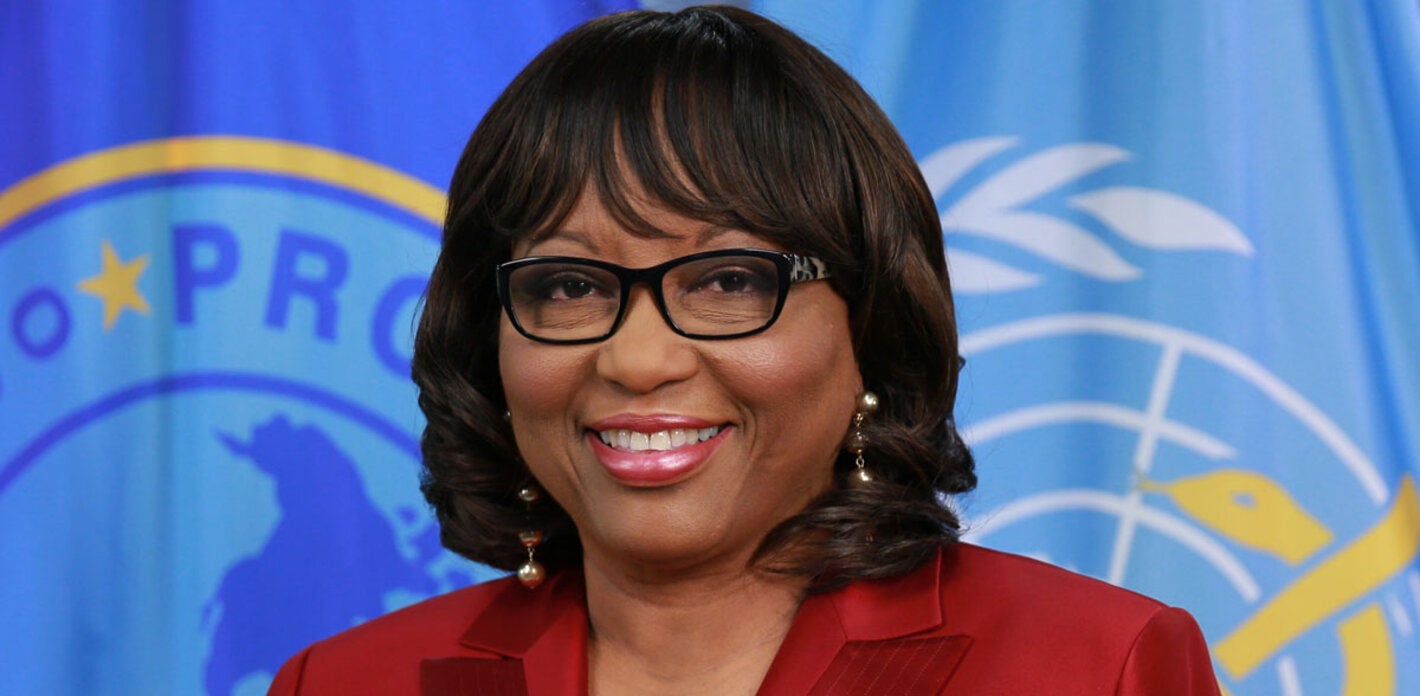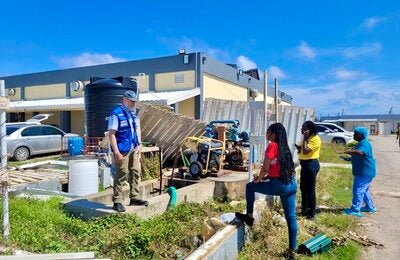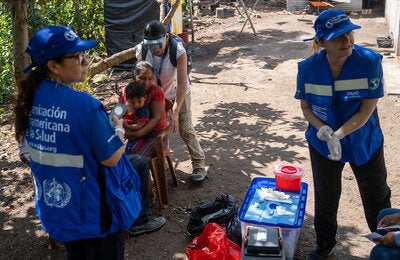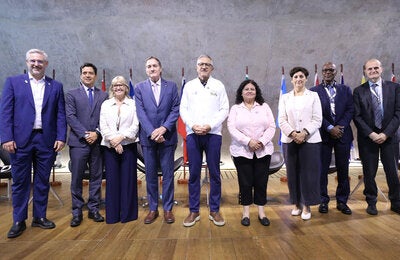
Washington, D.C., 25 September 2017 (PAHO/WHO) - In a key accountability report presented today, the Director of the Pan American Health Organization (PAHO), Dr. Carissa F. Etienne, highlighted major health progress and challenges in the Americas during 2013-2017 and the role of PAHO's technical cooperation in those developments.
"There have been many achievements and successes, due in large part to Member States working ever more closely with us to shape-and to take responsibility for the results of-the technical cooperation," Etienne said, adding, "While there is much to be celebrated, there was unequal progress, and inequality emerged as a barrier to greater achievements."
Etienne, who was elected as PAHO Director five years ago, presented her Quinquennial Report of the Director 2013-2017 to health ministers and other high-level delegates from throughout the Americas who are attending the 29th Pan American Sanitary Conference this week in Washington, D.C.
The report details technical cooperation by the Pan American Sanitary Bureau, PAHO"s secretariat, in areas ranging from strengthening preparedness for disasters and other health emergencies, to support for legislation and regulation of potentially harmful products.
Examples of this technical cooperation during the five-year period of the report include helping countries prepare for the possible introduction of Ebola virus in 2014, and helping them cope with the rapid and wide spread of chikungunya virus in 2014 and 2015. An especially significant challenge faced by the countries during the period was the Zika virus, which spread throughout the Region in 2015 and 2016, causing a sharp increase in birth anomalies and the neurological disorder Guillain-Barre syndrome.
"The Bureau worked with countries and partners to track the epidemic while providing critical support in clinical and laboratory diagnosis of cases, case management, and vector control, among others," noted Etienne. "We also worked with partners to provide evidence-based, ethical guidelines and advice to Member States."
Other key PAHO support for member countries included assistance in responding to natural disasters that included the 7.8-magnitude earthquake that struck Ecuador in 2016 and the category-5 Hurricane Matthew, which wreaked havoc in the Caribbean the same year. To strengthen its technical cooperation in emergencies, PAHO recently merged its disasters and humanitarian assistance program with its epidemic alert and response team to create the new Health Emergencies Department, paralleling a similar move by WHO.
Regional health milestones
The report highlights three historic public health milestones during the reporting period: the regional elimination of endemic rubella and congenital rubella syndrome from the Region in 2015 and the elimination of endemic measles in 2016. PAHO contributed to these achievements by helping countries strengthen their national immunization programs, by tracking outbreaks and monitoring immunization coverage, by promoting and coordinating the annual Vaccination Week in the Americas, and through the PAHO Revolving Fund, which allows countries to purchase vaccines and immunization supplies at affordable prices.
Other achievements in the period include the elimination of onchocerciasis in Colombia, Ecuador, Guatemala, and Mexico; the elimination of Chagas disease in Brazil, Chile, and Paraguay; and the elimination of trachoma in Mexico. In addition, by mid-2017, more than 20 countries and territories were reporting data consistent with the elimination of mother-to-child transmission of HIV and syphilis.
In the area of noncommunicable diseases (NCDs), the leading causes of death and disability in countries throughout the Region, the report details PAHO-supported progress by countries in implementing legislative, regulatory, and fiscal measures to reduce NCD risk factors. These measures include taxes on sugar-sweetened beverages, front-of-package labelling of processed food products, restrictions on marketing of unhealthy products to children, and implementation of tobacco control measures such as graphic warnings on packages and legislation on smoke-free public spaces.
Progress toward universal health
One of the most important developments during the five-year period was the adoption in 2014 of the regional Strategy for Universal Access to Health and Universal Health Coverage, in which PAHO Member States pledged to work toward ensuring that all people-regardless of their ability to pay-receive the health care they need when they need it.
Etienne said that, going forward, PAHO would prioritize technical cooperation to help countries further progress toward universal health. This includes helping countries identify ways to increase public financing for health, reorganizing health systems for greater efficiency and effectiveness, and expanding access to health care for vulnerable populations, such as ethnic minorities, while also collaborating with other sectors to improve the social conditions that affect health.
"While highlighting achievements," said Etienne, "we recognize that many challenges to national, subregional, and regional health development remain, which we must face together, with an unwavering focus on equity."
The Pan American Health Organization (PAHO) works with the countries of the Americas to improve the health and quality of life of their populations. Founded in 1902, it is the oldest international public health organization in the world. It acts as the WHO regional office for the Americas and is the specialized health agency of the inter-American system.
Links
- Quinquennial Report 2013-2017 of the Director of the Pan American Sanitary Bureau (online version)
- Quinquennial Report 2013-2017 of the Director of the Pan American Sanitary Bureau (PDF format)



